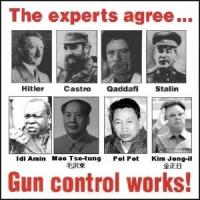 I don’t often get involved in a debate over gun rights because, frankly, I don’t care. I will own guns whether the government “decides” it is my right or not, and I don’t care to get involved in an effort to beg the government to leave my rights alone.
I don’t often get involved in a debate over gun rights because, frankly, I don’t care. I will own guns whether the government “decides” it is my right or not, and I don’t care to get involved in an effort to beg the government to leave my rights alone.
However, the other day an acquaintance of mine expressed his opinion on “gun control.” He stated that he, as a non gun owner, is vulnerable to people with guns and that he believes they should be taken away from others to make him safe.
I’d like to note that I have spoken with him several times. He’s a good person, who would do no harm to another. In fact, he’s a preacher of a small congregation.
I structured my response with a logical argument. First, one must admit that there is absolutely, positively no way you will ever “rid” the country of guns. Consider the “war on drugs” and the pipe dream of a “drug free America.” This has been going on for decades, and people still use drugs. If you’re not convinced that drugs can’t be eliminated, consider a prison population: There is no greater scenario for control over individuals because you can strip the prisoners of all their rights, confine them to space, and assign guards to monitor their every move – and yet the drug trade thrives in prisons.
Disposing of the myth that we can rid the country of guns, I then pointed out that if my guns were taken from me, my family and I would be vulnerable – why would he wish to put us in that position, or believe that he has the “right” to do so? If he chooses to be “vulnerable” that’s fine, but why wish that status on others?
But here’s the crux of the whole argument: I do not wish to give up my guns, they would have to be taken from me. How would they be taken? By force. So to take them from me would require violence against me. The paradox is that most individuals who would not commit violence toward one another are happy to unleash the violence of the State upon their neighbors. Let’s say he gets his wish, and the police (and probably the military) begin gun sweeps of residences. Is the person who shows up at my door to take my guns going to be “civil” about it? Will he be wearing a suit, asking nicely if I have any guns in the house, and would I please turn them over to him? No, of course not. In fact, there won’t be one person, there will be many. And they’ll be armed to the teeth. What should happen if I refuse to turn over my guns? What if I assert my natural right to defend my property? Violence will ensue, and they’d kill my entire family if they “had to” to bring me in compliance with the “law.”
Is this the outcome my friend would wish on me, my family, and countless others? Would he feel it is “worth it” as mass violence is initated against gun owners and thousands, hundreds of thousands, perhaps millions of innocent people are killed?
I would hope not, but the Milgram study shows that people are willing to countenance violence against others as long as it is initiated by, or advocated by, persons of “authority.” I would recommend reading Chapter One of Healing Our World by Mary Ruwart for the implications of this study.
I didn’t take up the common arguments for gun rights, because as I stated before, my right to bear arms is an absolute right that is not up for vote. I don’t care to argue about statistics, or the “success” of gun control in other countries.
I simply wanted to point out that seemingly nonviolent people can and will support violence against others, whether they realize it or not. One must think through the consequences of that which he advocates.